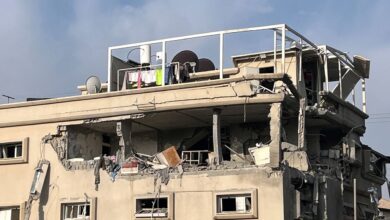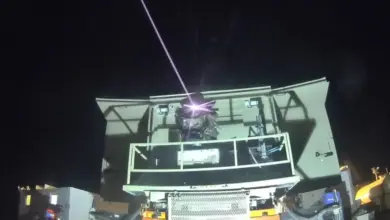Channel 2 News, Israel’s most widely watched news network, opened its broadcast Thursday night with news of a rocket attack earlier that day.
“Right before the Passover holiday when thousands of vacationers make their way to [the Israeli resort city of] Eilat, a grad rocket was shot from Sinai towards the city,” said Yonit Levi, the program’s new anchor. “Though there are no injuries or damages, there’s a warning sign and a clear message: Terror organizations operate unhindered in Sinai.”
As Israeli politicians on Thursday swore to retaliate following the attack on the southern Israeli resort town of Eilat, Israeli media outlets dwelled on the Egyptian government’s failure to control Sinai.
In contrast to official statements, mainstream broadcasts and press reports revealed a more nuanced version of Israeli strategic thinking. Outlets weighed the risk of worsening already tense relations with Egypt against fears that Sinai might become a staging ground for increasingly frequent attacks against the Jewish state.
The decades-long peace treaty between the two countries has been called into question following the ouster of Hosni Mubarak, one Israel’s most stalwart allies in the region, in February last year.
Immediately following Thursday’s attack, Israeli politicians vowed to fight back.
“We’ll strike at those who attack us. There can be no immunity for terrorism; it must be fought and we are doing so," said Prime Minister Benjamin Netanyahu.
Israeli defense minister Ehud Barak, for his part, vowed to “strike those responsible for firing at Eilat.”
The attack, which Israel claims was launched from Egyptian territory in Sinai, would be the second of its kind since the beginning of the Egyptian revolution. In August last year, gunmen from Sinai infiltrated Israel and killed eight Israelis on a desert highway. Three Egyptian soldiers were killed in Israel’s counter assault, an incident which caused a diplomatic crisis that eventually led to the storming of Israel’s embassy in Cairo.
Israel responded to the August attack by expediting construction of its border fence, which is due to be completed in early 2013. However, rocket attacks such as Thursday’s lack a comparatively quick fix.
Although the newly developed Iron Dome system intercepts some rockets launched from Gaza, experts believe that effectively employing the costly batteries along Israel’s much longer border with Egypt would be untenable financially.
Egypt denied Thursday’s rockets were fired from Sinai. Nevertheless, Israeli media outlets on Thursday did not doubt their government’s claim. Instead, they lamented what they perceived as a state of anarchy in the peninsula.
“In order to emphasize how out of control half the peninsula is, it is enough to point out that today, Sinai is filled with vehicles locally known as ‘Palma’ – vehicles without license plates smuggled from Libya,“ writes Arab Affairs analyst Ehud Yari on the website of Channel 2 News. “The Egyptians have simply lost control over traffic in half the peninsula.”
Yaari believes, however, that Egypt could reassert its authority over Sinai, if it had the will to do so.
Ron Ben-Yishai, a veteran war correspondent, believes that Egypt is incapable of controlling the Bedouins. “It is clear enough that the Egyptians won’t do the work for us, not because they don’t want to but because they can’t,” Ben-Yishai writes in Yediot Aharonot, Israel’s most widely circulated Hebrew language daily.
“Their control is precarious in central and eastern Sinai. Even though their security forces are concentrated mostly on a strip of shoreline in the north, and even there they’re not really in control.”
Writing in the left-wing Haaretz daily, analyst Amos Harelnotes that Egypt’s government has resigned itself to the anarchy: “Even though Cairo doesn't admit to it officially, all involved have already come to understand that the desert peninsula has become a no-man's land, over which Egyptian authorities don't bear even the slightest pretension of control.”
The impoverished Bedouins prosper from the smuggling to the tune of $500 million in annual income, according to Yari.
“This is the Bedouins’ livelihood,” he said. “There is no chance that any Egyptian government… can offer a real economic alternative in place of these profits. All of the declarations about renewing old development plans are worthless. Cairo simply doesn’t have enough resources to devote to Sinai.”
To make matters worse, many Israeli analysts note that in using Sinai as a basis for attack, Palestinian militants are exploiting Israeli fears of upsetting the ruling military council, the “Egyptian street,” and the Islamists, lest the peace treaty end.
As of Friday morning, it was unclear whether the attacks were carried out by Palestinian militants or Bedouins acting on their own. However, analysts agreed that it is not surprising that Palestinian militants, who have easy access to Sinai through underground tunnels, are seeking to use Sinai as launching pad against Israel.
Not only did Israeli analysts appear to agree about the causes of Thursday’s attack, but they also agreed that there is not much Israel can do to prevent rockets.
“Israel is powerless as terrorists target touristy border town,” read the headline of Harel’s article, followed by the sub headline: “Jerusalem, fearing complications with its already tense relations with Egypt, cannot respond to a growing Sinai terror threat.”
“The Israel Defense Forces has no real solution to… rocket fire threatening Eilat,” argued Harel, not only because it must avoid further straining its relations with Egypt, but also because it lacks a “clear culprit on the other side.”
A similar sentiment was echoed in the Jerusalem Post, Israel’s most widely read English daily.
In an article entitled “The Analysis: Israel’s options in Sinai are limited,” Yaakov Katz quoted an anonymous senior Israeli official as telling him:
“If we attack, we are accused of violating Egyptian sovereignty and if we don’t attack then a rocket lands in Israel.”
The only way to address the problem of rocket fire is through diplomacy, namely US pressure on Egypt, according to Yari. He said that the United States and Europe should threaten to cut foreign aid to Egypt unless they act forcefully in Sinai.
“Only Western pressure on Egypt to act can improve the situation,” he wrote.
Ben-Yishai, in contrast, called for Israel to craft a military solution to the problem because Egypt is incapable of asserting its control. Israel’s new security arrangement should include better intelligence on the ground within Sinai, and a readiness to use aircraft, artillery, and even naval forces to target militants over the border.
“In short, a system similar to the one Israel currently employs on its Gaza border.”
Ben-Yishai conceded that such an arrangement would pose dangers to the Israeli-Egyptian peace treaty by provoking popular anger within Egypt, but argues that nonintervention risks making the peace treaty irrelevant. He said Israel could find itself in the same situation with Egypt as it did with Gaza following its withdrawal from there in 2005 – i.e. frequent rocket attacks on Israeli communities.




